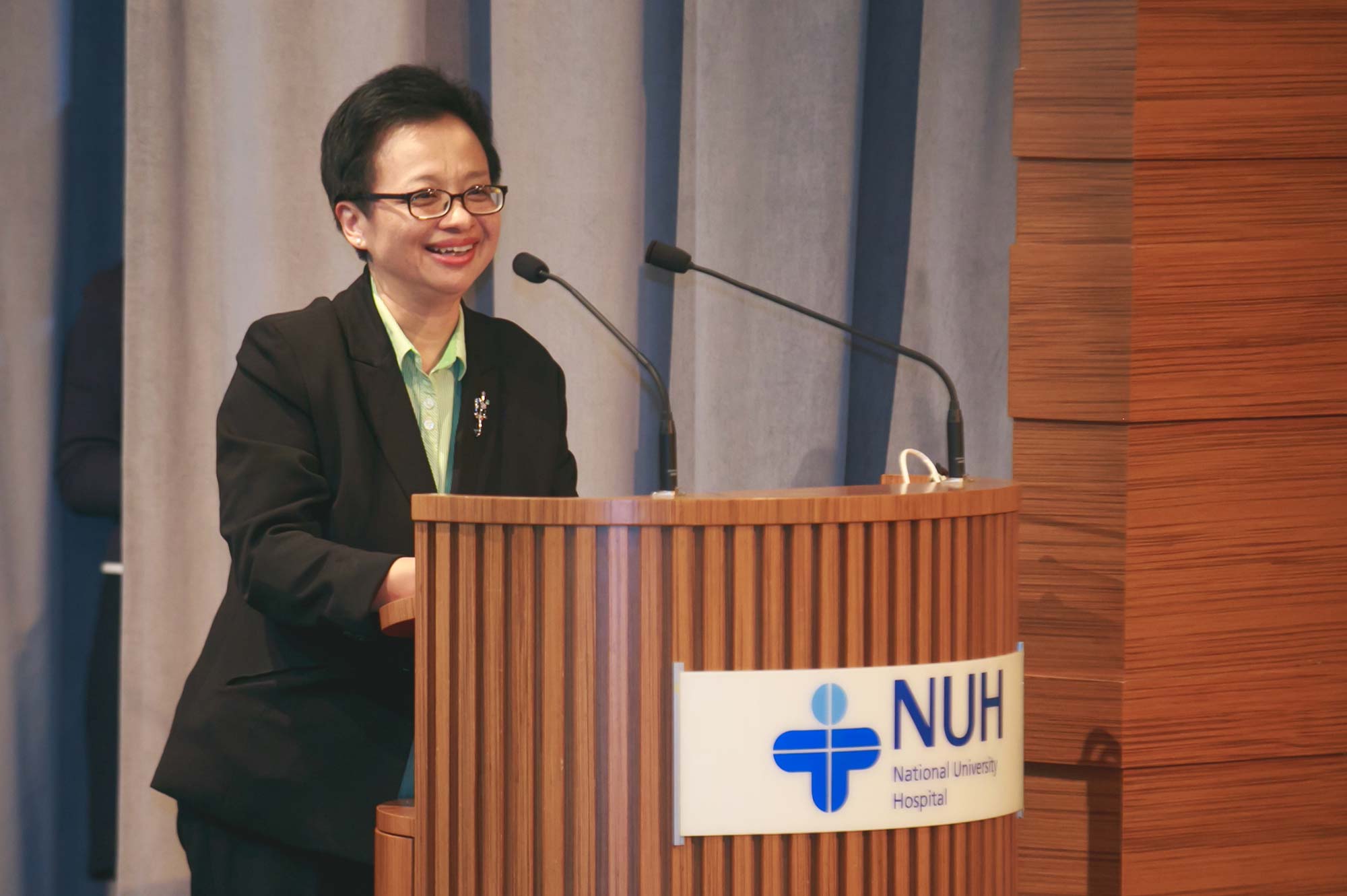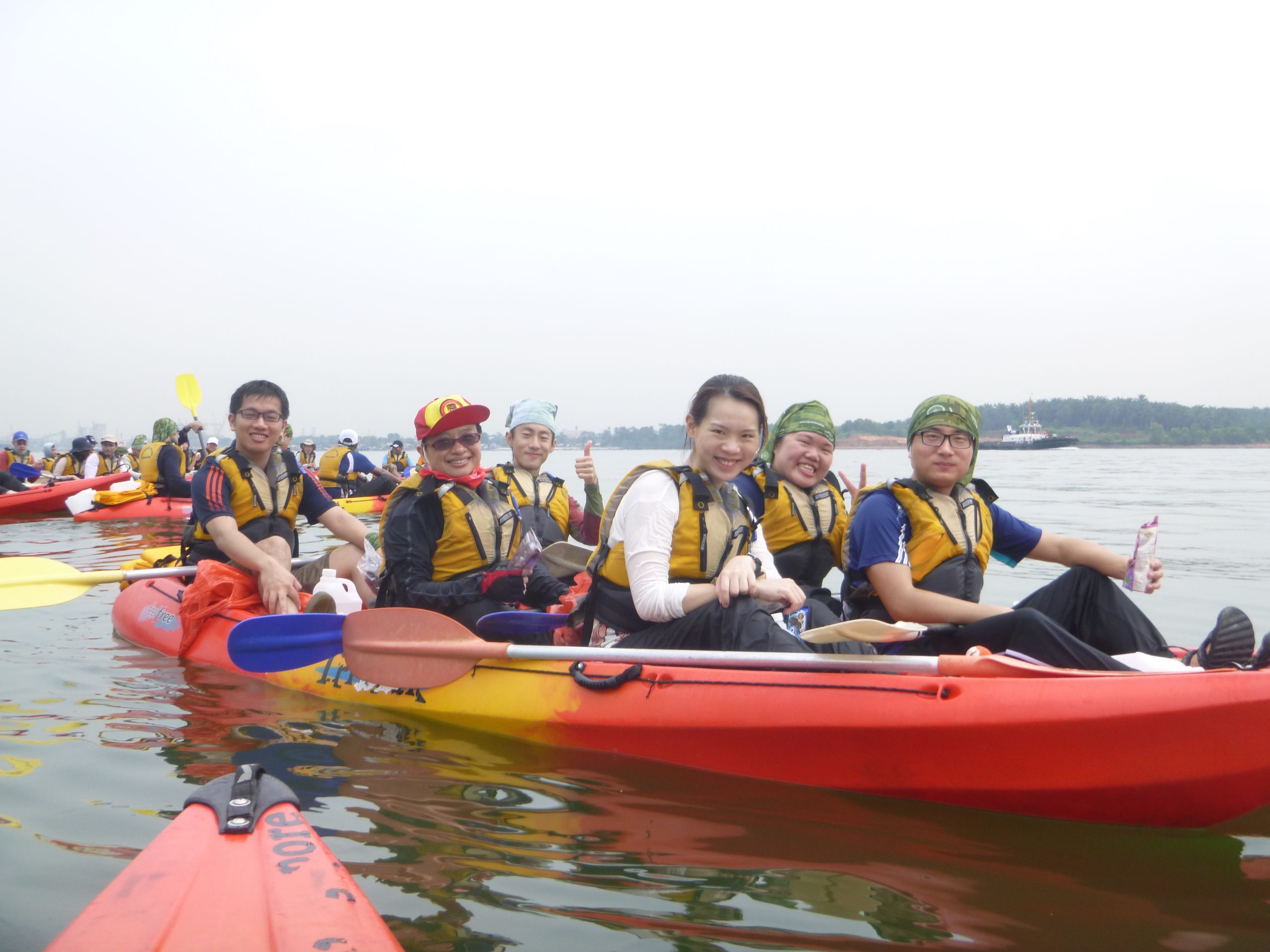Keeper of The Flame

u00a0Assoc Prof Shirley Ooi speaking during the NUHS Residency Graduation ceremony in 2016
A familiar face in the NUHS Residency programme since 2009, Associate Professor Shirley Ooi handed the reins to her successor at the start of July 2020. She tells why helming the NUHS Residency programme for more than a decade has been a deeply satisfying and meaningful chapter in her professional career.
1036 residents, 32 residency specialist streams, 11 years. The numbers tell the story of how the NUHS nurtures and develops its corps of residents and prepares them for the rigours and challenges of medical practice. For Associate Professor Shirley Ooi, the erstwhile Designated Institutional Official (DIO) of the NUHS Residency training programme, it is also the tale of her personal journey in stewarding the programme from its inception, culminating in her receiving the 2020 Accreditation Council for Graduate Medical Educationu2014International (ACGME-I) Physician Leader award and to her handing over the reins to her Emergency Medicine colleague and successor, Assoc Prof Malcolm Mahadevan on 1 July 2020.
As the DIO, NUHS Residency, Assoc Prof Ooi serves as keeper of the flame, responsible for driving the training and development of junior doctors so that they become competent doctors and specialists who bear the NUHS hallmark of excellence in medical practice and service.
nThe NUHS Residency training programme was recognised by the ACGME-I in 2009, branching out from its parent organisation, the ACGME. For a residency programme to be ACGME-I-accredited means that the residents are taught based on a model that emphasises on professionalism, selfless responsibility and patient- centeredness that goes beyond book knowledge.
nThe DIO works in collaboration with a Graduate Medical Education Committee to oversee all Joint Committee on Specialist Training and ACGME-I-accredited residency training programmes in NUHS. On a daily basis, the DIO bears the hefty responsibility of handling all the administration systems, processes, programme directors and residents that counts towards establishing a good residency training programme.

MANY HATS
Assoc Prof Ooi holds the distinction of being the longest serving DIO among Singaporeu2019s three healthcare clusters, having been there right at the start of the ACGME programme in 2009. For the first 8 months, her new tenure as DIO coincided with her day job as Head of the NUH Emergency Medicine Department and her position as Chair of the Specialist Training Committee (STC) of Emergency Medicine at the national level. Yet, the mother of three not only remain unfazed by these responsibilities, but juggled them deftly and with relish. Looking back, she remains grateful for teachable moments like this, which have translated into numerous valuable learning opportunities that have helped shaped lifelong core values she holds dearly.
nu201cThe DIO job has its fair share of challenges,u201d said Assoc Prof Ooi. These range from dealing with multiple stakeholders who hold differing views and negotiating policies to better apply them to the local context. Caring for her flock of programme residents and trainee doctors takes additional effort, especially when they have concerns and issues that required her input and intervention. To top it off, the DIO must always keep abreast of constant changes in the educational and residency landscape to ensure that the programmes remain relevant. It also takes some degree of moral courage to tackle difficult issues in a fair and objective manner.
u201cTo put it simply, the DIO is like an octopus with many tentacles that have to work simultaneously and in coordination to survive!u201d Assoc Prof Ooi said.
nAlong with the challenges come the delights. They include working with and getting to know colleagues across the medical disciplines, moulding and mentoring a generation of doctors, forming lasting bonds of friendship. These, as well as the scope, scale and intensity of the DIO role, proved to be so absorbing that the 11 years she held the appointment seemed to go by in a flash.
nThe broad disciplines offered by the NUHS residency programme, its strong teaching culture and a reputation for clinical excellence todayu2014these came about over the years of effort put in by the dedicated and enthusiastic team of programme directors and faculty staff that she assembled and led when the AGCME programme began. It was a very busy and hectic time, Assoc Prof Ooi recalled. u201cWhen I look back, I can only say it is by the grace of God that I managed to succeed!u201d

STRONG BONDS
She is gratified that her efforts at building up a cohesive and like- minded team that set out to fulfil a vision of transforming graduate medical education at the NUHS
has paid off.
u201cThe bond between me and the pioneer batch of Programme Directors is particularly strong as we faced unprecedented challenges of getting all our programmes accredited by ACGME-I within a very short timeline.u201d
nBesides attracting the best and most promising residents, the NUHS Residency training programme seeks to provide opportunities to acquire additional skills through the distinction tracks in medical education, quality and innovation and research which runs in parallel with the
ncore residency programme. Residents can even train and cultivate leadership skills through an in-house Residency Leadership Development Programme.
nAs part of the residency programme, Assoc Prof Ooi and then-NUH CEO Joe Sim as well as then-CMB Professor Aymeric Lim wanted to ground the young doctors in the NUHS values of teamwork, respect, integrity, compassion and patient-centredness. They packed the residents off for bootcampu20143 days and 2 nights at the Outward Bound Singapore (OBS) on Pulau Ubin. There, the trainees soaked up an intensive orientation programme that was designed to develop teamwork, mutual interdependency and resilience in the face of mental and physical challenges.
nLeaders lead through modelling exemplary behaviour, and Assoc Prof Ooi decided that she would not shy away from the course. That decision led to her attending 19 consecutive runs at the OBS. It paid off, as through the numerous opportunities for interaction with the residents, she got to know many of them.
u201cI am far from being sporty. I canu2019t even swim, but I mustered enough courage to kayak 18-km each time with the residents. I have been advised by my orthopaedic surgeon not to do it because of back problems but thankfully with regular gym sessions, my back can still take the exertion.u201d
nSpending time together with the residents away from the clinical setting also gave her many occasions to hear from the residents on how the NUHS residency programme could be improved. This translated to better supervision and more effective management of the entire NUHS residency programme.
nu201cKnowing the residents well beyond just Emergency Medicine residents meant that I have a mental database to call upon when I saw an opportunity for them to contribute beyond their programme level. It also enabled me to get ground feedback easily since they would have known me already at a personal level and I could just call them up to talk to them.u201d
nIn the early days, she got to know every single one of the residents in the initial batches. It became increasingly hard to do so as their numbers grew.
nBut while sheu2019s doffed her DIO hat, her educatoru2019s cap sits firmly in place. In her new role as Associate Dean at the National University Hospital (NUH), Assoc Prof Ooi will be involved in undergraduate medical education, something she has long experience in, having taught healthcare professionals ranging from medical students, PGY1s (House officers), medical officers, residents, senior residents and nurses. It is a role she is looking forward to and which looks just as likely to lead to future generations of well-trained, confident and compassionate NUS Medicine graduates.
